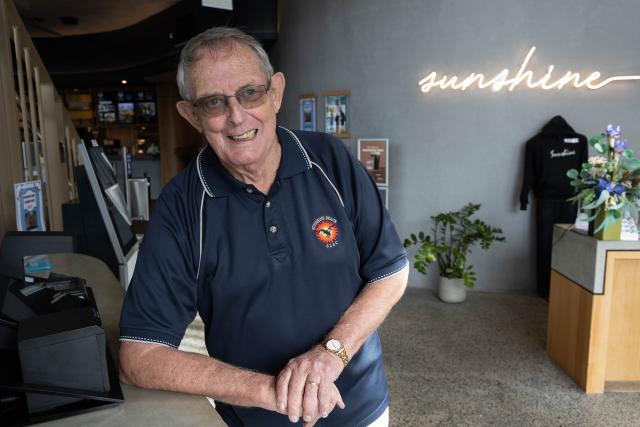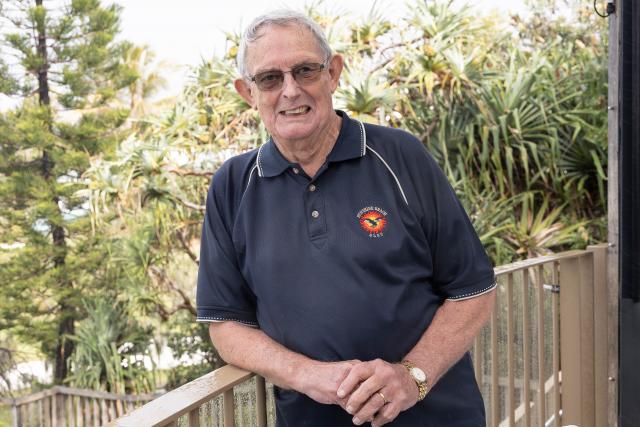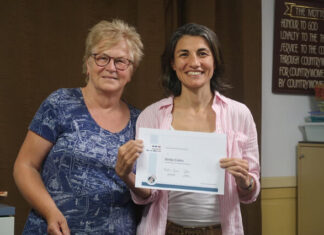“It’s blown me out of the water. I can’t believe it,“ said Ross Bartlett, a veteran of 66 years of service to Surf Life Saving Australia, who on Monday was recognised in the inaugural King’s Honour List with a Member of the Order of Australia (AM).
“I guess you could say that after so many years it really gets into your blood and definitely becomes a way of life. It is with you forever.“
For Ross it started back in 1957, when on November 17 he passed his bronze medallion examination at Yamba Beach.
“In those days it was the six man bronze squads with the reel line and belt. Discipline was strict and it all boiled down to good team work. You had to perform all six positions and your drill had to be spot on. There was no fooling around if you stepped out of line you were gone, that’s it, no argument.“
“Our instructor was a bloke named Max Godbee and he made such an impression on me that I am still in the movement. He made it fun, but at the same time his drill work was strict and we had to train to R&R (the elite competition squads) standards.
“But most important he made us understand what it was all about. During the week we trained in Fisher Park Grafton on the grass and during the weekend we trained at the beach.“
Ross was born in Belligen in June of ’41 and went to school in Dorrigo and during his early years rode a horse to school.
“My family was big in the cattle business and my father Irvine, being well known, often worked as a cattle judge at the Sydney Royal show.“
However when Ross was nine, his father passed away from polio and the family moved to Grafton and at the age of 10 Ross settled into the local school where he was to stay until leaving at 15.
“At school my main interest was rugby league, playing in the forwards and I can still remember running on to the field as captain of the primary school team, a big thrill. After leaving high school I started work in the local bank of NSW and stayed there for four years before taking a transfer to Sydney.“
It was while in Grafton that a good mate Bruce McLean suggested that they join Yamba Surf Lifesaving club, which they did, obtaining their bronze in ’57.
“There was no Olympic pool so we did our swim training in the Clarence River, a bit rough but it served the purpose.“
While in Yamba club Ross competed in both junior and senior R&R. (the prestigious Rescue and Resuscitation event) and also beach events.
“Like many good bronze squads our discipline and drill was strict and of the highest order so after getting our bronze we went straight into R&R. In those days that’s how it had to be, they had to weed out those who could not hack it, because when it came to patrol work all you had was your mates and the reel line and belt. There were no IRBs, jet rescue skis or rescue boards.“
Following his bank transfer to Sydney, Ross applied for a transfer to the Bondi Surf Club and in ’59 he became an active member thus continuing his service, service that saw him in 1963/64 on the beach as a patrol captain.
“Boy was that a shock, coming from Yamba to the massive crowds and big surf on Bondi beach; serving as a patrol captain was definitely an experience.“
At the bank he met Helen the lady who was to become his wife.
They married in February 1964 and later became the proud parents of two children, son Rodney and daughter Jodie.
At Bondi he continued competing and in ’62 he qualified for his instructors’ certificate. Then in ’67 he was awarded his Long Service Membership Badge, a membership still in vogue today.
It was during this period that Ross became heavily involved in the very important community resuscitation demonstrations conducted by his club. He also assisted with the Sydney Sun newspaper community Learn to Surf Campaign.
“You have to remember at that time mouth to mouth resuscitation was relative new as was CPR(Cardiopulmonary Resuscitation) so it was vital that lifesaving was doing all it could to educate the general public.
“My wife Helen, who had completed resuscitation courses, was also assisting us, so it became something of a family affair.“
The other part of the campaign Learn to Surf was also very successful; teaching how to use the surf-o-plane, a major piece of gear for surfing Bondi Beach.
“Not only for the Bondi clubbies, but also for lifesavers throughout Australia, the teaching of modern resus methods was about to become of major concern.“
Then in 1976 he resigned from the bank and went into the milk business, buying a milk run first at Marickville then later in Shalvey. Several years later they sold up and they went on an extended holiday, right up past Cooktown (via Mooloolaba,) then back down to the Sunshine Coast, first stopping (in 1979) at a place called Noosa Heads.
“Never been there before,“ said both Ross and Helen laughing, “but we took one look and thought this is it.
“We couldn’t believe how beautiful it was. We decided to look around for a business and bought a coffee shop in Tewantin, then a quick trip back to Sydney, settled everything and returned to live in a caravan till everything was finalised down south. By 1980 we were finally settled and in ’81 I joined Sunshine Beach Surf Lifesaving Club.
“Then after several years of serving coffee we moved into the world of motel and resort management.“
On joining Sunshine, Ross continued to study and train, obtaining his Examiners Certificate, plus his Advanced and Examiners Resuscitation Certificates. From ’83 to ’85 he held the position of Chief Instructor.
“In those days we were a small club, so I was mainly involved in bronze training and awards. We had very few competitors just a few beachies and that was it. Our club was a tin shed at the back of the beach. Being small we were doing patrols every second or third weekend and fundraising was chook and meat tray raffles.”
“In 1983/84 a meeting was held at the Noosa club between our management and branch and the decision to build a clubhouse was made. This was completed in ’86“.
That year saw Ross elected club president, a position he was to hold till ’89, then on stepping down he served as vice president for the next four years.
’’When I took office we were in the development stage, working to make ends meet. I saw my role as the man to keep things going and this I did to the best of my abilities.“
Apart from club obligations, his other duties and awards were many. At branch level he served four years as a district supervisor and one as the branch supervisor.
At state he served on several committees and in competition judged 32 state and national titles. International level saw him officiate at 11 World International Life Saving Championships. This resulted in his being awarded four (a bronze, silver, gold and platinum) International Life Saving Medals.
In 2000 he received one of his proudest achievements, a letter informing him he had been selected as a Sydney Olympic Torch Runner.
“As a sport nut I just couldn’t believe it, even now I find it hard to believe.“ Then 2005 another top award – Life Member Surf Life Saving Association of Queensland.
However, back in ’83 a project was started that was to play a major role in the education of medical students in the University of Queensland, and it was in the hands of our lifesavers. It was a series of courses in resuscitation and examination and each would go for a period of one month and there could be two or three a year.”
With his qualifications and experience Ross was invited to assist as an instructor.
“These courses, the best and most informative in which I was ever involved, were under the control of the late legendary resuscitation expert Professor Tess Brophy. Starting in 1983 and continuing through till 1988 it required both Helen (who was also involved) and I to drive to Brisbane and back once a week. This project was of the utmost importance for if the students failed their future studies were indeed in jeopardy.“
This was indeed a massive undertaking one that was not to be taken lightly.
“These courses came about when Professor Brophy, through her connection with Queensland Life Saving, realised that our doctors of tomorrow received very little resus training. Our involvement helped to correct a situation of the utmost importance,“ said Ross.
“On looking back over my life, I find it amusing to think that a young man, expected to be the third generation in a big cattle family ended up a dedicated surf lifesaver.“
One could say that the cattle industries loss has been life savings gain, for over the years Ross has been the proud recipient of nine major awards at branch, state, national and international level and has officiated at competitions around the world.
In 2019 his attitude and dedication was recognized when he became the first ever member of the Sunshine Beach Surf Life Saving Club to receive its highest award, life governor and now he has received a much deserved AM.
The lifelong dedication and achievements of some of our unpaid volunteer lifesavers is beyond belief. But in some men the personal satisfaction that they experience is, incredible as it may seem, reward enough.









